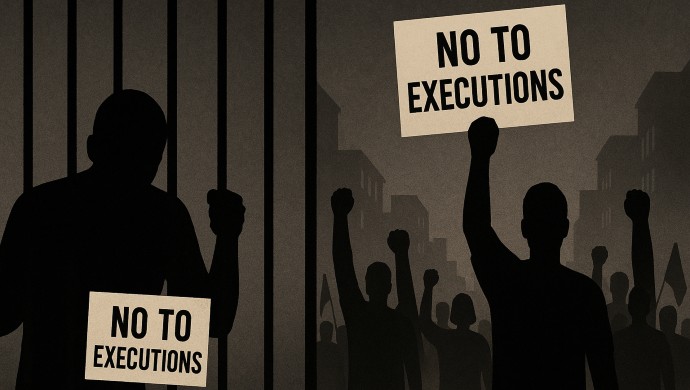The Iranian regime’s frantic use of capital punishment as a tool of political suppression is being met with an unprecedented wave of coordinated defiance. On Tuesday, July 15, the “No to Executions Tuesdays” campaign marked its 77th consecutive week, with political prisoners in a record 48 prisons across Iran participating in a hunger strike. The campaign, which began in January 2024, has now become a powerful symbol of the unyielding spirit of resistance inside the regime’s dungeons.
This week, prisoners in Yazd Prison joined the growing movement, expanding its reach and demonstrating the campaign’s sustained momentum. Simultaneously, this organized dissent within prison walls was mirrored by courageous solidarity protests on the streets of major cities, including Tehran, Isfahan, Karaj, Rasht, and Yazd, creating a unified front of resistance against the clerical dictatorship.
A judicial system weaponized for suppression
The prisoners’ intensified protest comes as the regime accelerates its execution machine in a desperate attempt to instill fear. Since June 21 (the beginning of the month of Tir in the Persian calendary), the authorities have executed at least 44 individuals. These state-sanctioned killings included at least one woman and two medieval-style public hangings in the cities of Miandoab and Bukan.
In their weekly statement, the protesting prisoners noted that these are merely the executions that have been publicly reported. They described the chilling motive behind the public displays of brutality, stating that the regime, “facing crisis from all sides, has made public execution an instrument to contain the uprising and public anger.”
Week 77 of #NoToExecutionTuesdays: 48 prisons now join the hunger strike, including Yazd.
New death sentences, solitary confinement for 3 Arab political prisoners, 44 executions in 3 weeks.#StopExecutionsInIran pic.twitter.com/6lnjlSvqm6— SIMAY AZADI TV (@en_simayazadi) July 15, 2025
The regime’s judiciary is also working overtime to issue new death sentences against political dissidents. In Ahvaz, a revolutionary court recently handed down two death sentences each to three political prisoners: Farshad Etemadifar, Masoud Jamei, and Alireza Mardasi. In another alarming development, three Ahvazi Arab political prisoners on death row—Ali Mojadam, Moin Khanfari, and Mohammadreza Moghaddam—were transferred to solitary confinement, a move that often precedes execution. The complete lack of information about their status has heightened fears among their families and human rights activists of their potential “enforced disappearance.”
This situation prompted UN Special Rapporteur on Human Rights in Iran, Mai Sato, to sound an international alarm over the escalating wave of repression. Meanwhile, the judiciary continues to deny justice, rejecting for the fourth time the appeals for a retrial for political prisoners Mehdi Hassani and Behrouz Ehsani, whose cases are riddled with legal ambiguities and whose lawyers have been illegally denied access to their “classified” files.
*Reports of imminent execution of three Ahwazi Arab political prisoners*
I have received reports that Ali Mojadem, Moein Khanfari and Mohammadreza Moghaddam face imminent execution for baghy, despite allegations of serious fair trial violations and torture-induced confessions.…
— Mai Sato (@drmaisato.bsky.social) (@drmaisato) July 10, 2025
“If you execute, we will revolt”: A nation’s defiant response
The regime’s campaign of terror is failing to silence the Iranian people. In tandem with the prisoners’ hunger strike, citizens and youth took to the streets in numerous cities, including Tehran, Isfahan, Tabriz, Rasht, and Kermanshah. Their chants echoed a clear and unified message of defiance.
Protesters held signs and shouted slogans that directly challenged the regime’s authority, such as “Political prisoners must be freed!” and the powerfully resonant warning, “If you execute, we will revolt!”
These protests are a direct answer to the call for national solidarity issued from within the prisons. In their statement, the prisoners urged their compatriots to action: “We call on the freedom-loving people of Iran to disrupt the murderous repressors at the scenes of public executions and turn them into scenes of resistance and exposure.”
Inhumane conditions as another form of punishment
Beyond the gallows, the regime is employing another method of cruel and unusual punishment against political prisoners. Families report that conditions in prisons like Fashafuyeh and Qarchak—where many political prisoners were violently transferred after the missile attack on Evin Prison—have become deliberately life-threatening.
Reports from these prisons paint a grim picture:
- Ventilation and climate control systems are non-functional in the sweltering summer heat.
- Access to safe drinking water and adequate food is severely restricted.
- Prisoners are systematically denied medical care, leaving those with serious health conditions to suffer without treatment.
- The ability to have in-person visits or even regular phone calls with family has been cut off.
Families warn that these conditions amount to a flagrant violation of human rights and are creating a dire humanitarian situation that could lead to further loss of life.
The 77th week of the “No to Executions Tuesdays” campaign is more than a protest; it is a testament to a deeply interconnected national resistance movement that refuses to be broken. The regime’s reliance on executions is not a sign of strength, but of a profound fear of its own people. As the prisoners declared in their unified statement, their resolve is unshakable: “Our power lies in our solidarity and unity, and we will undoubtedly sweep away the apparatus of repression and execution.”
The hunger strike was held in the following 48 prisons: Ghezel Hesar (Units 3 & 4), Karaj Central, Fardis Prison in Karaj, Greater Tehran, Qarchak, Khorin Prison in Varamin, Choubindar Prison in Qazvin, Ahar, Arak, Khorramabad, Yasuj, Asadabad Isfahan, Dastgerd Prison in Isfahan, Sheiban Prison in Ahvaz, Sepidar Prison in Ahvaz (men’s & women’s wards), Nezam Prison in Shiraz, Adelabad Prison in Shiraz (men’s & women’s wards), Firouzabad Prison in Fars, Zahedan (women’s ward), Borazjan, Ramhormoz, Behbahan, Bam, Kahnuj, Tabas, Mashhad, Gonbad-e Kavus, Qaem Shahr, Rasht (men’s & women’s wards), Roudsar, Havigh Talesh, Azbaram Prison in Lahijan, Dizelabad Prison in Kermanshah, Ardabil, Tabriz, Urmia, Salmas, Khoy, Naqadeh, Miandoab, Mahabad, Bukan, Saqqez, Baneh, Marivan, Sanandaj, Kamyaran, and Yazd.


